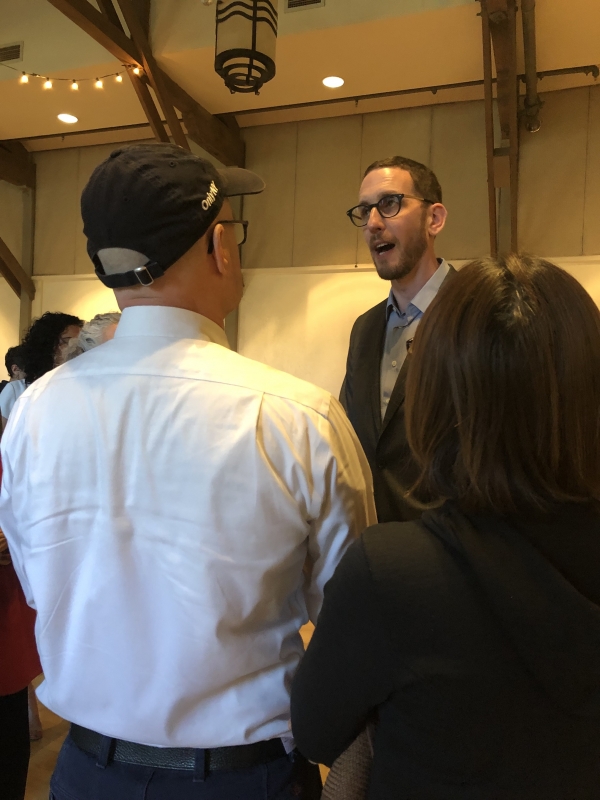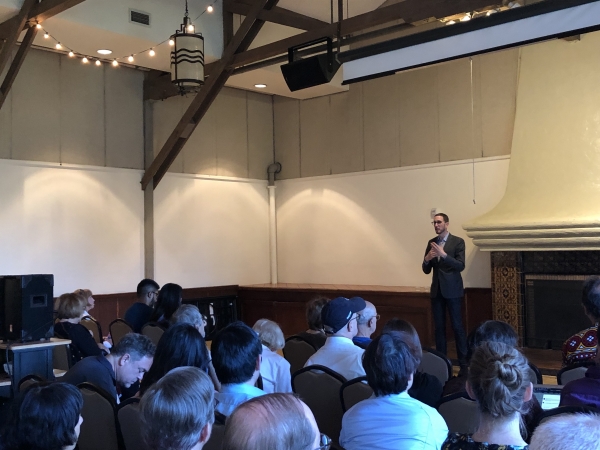State Sen. Scott Wiener, whose housing legislation Senate Bill 50 has energized housing advocates and galvanized intense opposition from Peninsula's elected leaders, came to Palo Alto on Friday to face some of his critics, push back against the common narrative that the bill represents an attack on local control and assure residents that despite a recent setback, the bill remains on track for passage.
Wiener's legislation, Senate Bill 50, aims to encourage housing development by loosening height, density and parking regulations in transit hubs. Widely considered the most ambitious and controversial of the roughly 200 housing bills that had been introduced this year, SB 50 hit a stumbling block last month, when the chairman of the state Appropriation Committee announced that the Legislature will not be taking up the bill until early 2020, at the earliest.
Despite this decision by state Sen. Anthony Portantino, D-La Cañada Flintridge, Wiener told a crowd of more than 200 residents at Lucie Stern Community Center that he is confident that the bill will ultimately win passage after the legislature takes it up again early next year.
"The bill is alive and well," Wiener said. "And the leadership has made it crystal clear that the bill is going to move forward."
The event, which was sponsored by the housing advocacy group Palo Alto Forward, was in many ways a counterpoint to a similar event in March, which was organized by opponents of Senate Bill 50 and which featured one speaker after another taking a shot at SB 50. While the Palo Alto City Council hasn't taken an official position on SB 50, it did approve a memo in April opposing a "one-size-fits-all approach to housing densities and land-use decision-making." Mayor Eric Filseth had also devoted most of the "State of the City" speech in February to criticizing SB 50, which he said effectively gives Sacramento the power to decide what local communities would look like.
Wiener pushed back against this narrative Friday. The bill, he said, largely defers to local height limits, though it waive local height limitations set below 45 feet within half a mile of transit hubs. The legislation also defers to local demolition, design and historic standards. Wiener, who served as San Francisco supervisor before going to Sacramento, also said that as a former local official, he agrees with those who say local decision-making usually leads to better outcomes. That said, local control "is not biblical," Wiener said.
"Local control is a good thing when it leads to good results, and I would say our system of pure local control on housing has not led to good results. What we're trying to do is a rebalancing, not to eliminate local control," Wiener said.
The housing crisis, he said, was in many ways a product of zoning decisions that cities across the state have been making over the past four decades, which effectively reserved 75% of the land for single-family homes. These zones, he said, have the effect of banning multifamily housing. They also constitute a ban on affordable housing and on income diversity.
"When we say the only kind of housing allowed is single-family homes, you're putting up a sign that says, 'If you can't afford a $3.5 million single-family home in Palo Alto or a $2-million average in San Francisco, you're not welcome to live here.' That's what this is about," Wiener said.
Some in attendance wondered whether the state should consider other strategies for addressing the housing shortage, including focusing on "depressed" areas where there's currently little development. Wiener argued that with an estimated shortage of 3.5 million housing units statewide, just about every area needs to do more to address the problem. Furthermore, placing housing in areas with jobs and transit makes the most sense from the environmental standpoint, he said.
"We need these 3.5 million homes and if we don't put them where the jobs are or where transit is, we'll have more and more sprawl and we will completely undermine our ability to meet our climate goals," Wiener said.
Some in Palo Alto, including Filseth, had argued that area employers should be asked to do more to fix the housing shortage. But when asked about whether the state should require tech companies to build more housing, Wiener pushed back against this view. Even if lawmakers required tech giants like Facebook and Google to build housing (which, he noted, isn't their area of expertise), that wouldn't change the fact that existing zoning would make approval and construction of these units a slow and difficult process.
"I personally think we all caused this problem," Wiener said. "Tech didn't create the land use rules, tech didn't ban apartment buildings in 75% of California, tech didn't say it should take five to 10 years to approve a project. Tech didn't do any of those things. We did those things."
Wiener also noted that despite opposition from many local officials, his bills remain broadly popular. In a poll conducted last month by the firm Lake Research Partners, two-thirds of respondents said they support SB 50. This included 79% of renters and 56% of homeowners. Another poll, by Change Research, showed 61% support for SB 50.
"The broad population of California understands that the system is broken and needs to be different. They understand that you can have single-family homes and apartment buildings in the same neighborhood and everything is going to be okay," Wiener said.
He also told the Weekly after the meeting that despite Portantino's decision last month to make SB 50 a two-year bill, he is confident that the Legislature will ultimately take up and pass the legislation.
"Senator Portantino is my colleague and friend and he is not a dictator," Wiener said. "The bill is going to move forward."
While Wiener faced a mostly friendly crowd filled with housing advocates and SB 50 supporters (including Vice Mayor Adrian Fine and Councilwoman Liz Kniss, the only Palo Alto council members who opposed the memo critiquing a 'one-size-fits-all' bill, were also the only two Palo Alto council members who attended the Friday event), his arguments did not persuade everyone. Planning and Transportation Commissioner Doria Summa, who opposes SB 50, argued that he had downplayed the impacts his legislation would have on local communities like Palo Alto.
Some of the areas where development standards would be loosened — notably, downtown and California Avenue — already suffer from traffic congestion and parking shortages, problems that would be exacerbated under SB 50. And some of the areas that are identified as "transit-rich" in the legislation, in fact, have meager bus service and falling ridership numbers.
"Of course, he can't understand how this would affect each municipality. But that's why a one-size-fits all bill isn't going to be successful in all cities," Summa said.
But Wesley Hemholtz argued that "one-size-fits-all" is an unfair way to describe SB 50 and agreed with Wiener's main point about the failures of local control. The existing system has left most families unable to afford housing, he said.
"It's really not one-size-fits-all. It’s one-size-fits-the-appropriate situation," said Hemholz, a Los Altos resident. "Near transit, these are the rules; near jobs, these are the rules. If you're not near transit and not near jobs, you will not have the same requirements imposed on you.
"You are leaving a lot of planning and decision to local communities, but the current system of local control is sort of one-size-fits-all that's statewide. And it hasn't worked for 40 years."




Comments
Portola Valley: Los Trancos Woods/Vista Verde
on Jun 11, 2019 at 1:42 pm
on Jun 11, 2019 at 1:42 pm
We are facing a crisis in providing adequate housing at the local, regional and national level. Our economic growth has fueled a need for more workers than can be housed within our existing communities, let alone supported by our existing infrastructures.
AB 50 seeks to address this need in a drastic and draconian fashion by mandating up to three times the present population for some communities. This is not a viable solution and, in fact only addresses a symptom, not a root cause.
We cannot simply pile more concrete structures on top of the existing ones without addressing the needs for more schools, better transportation, more city services and utilities, as well as additional neighborhood serving businesses. The infrastructure both public and private in many communities is already under performing and overextended.
Broad solutions which encompass, but are not restricted to, communities are called for, but should begin at the regional level and extend state and nationwide.
Let us consider creating new cities that are designed from the ground up, with zero net energy and water demands and which require limited transportation. Cities which have room to grow and are sustainable.
Finally, we must ask ourselves: How much of our environment and our quality of life are we willing to sacrifice for economic growth? We already enjoy some unenviable social and environmental issues. California is nearly in last place in quality of our roads, crowding of our roads, and performance of our schools. On the flip side we enjoy some of the highest sales tax, highest overall tax impact, highest cost of electricity, water, and gasoline, highest poverty rate and highest cost of housing in the nation. All this in the pursuit of the siren song of growth. Isn’t it time to seriously begin to question the trajectory of our society?
another community
on Jun 11, 2019 at 2:31 pm
on Jun 11, 2019 at 2:31 pm
Redwood City resident here. Clearly the status quo is not working. Homelessness has increased in the past 2 years while our economy continues to grow and startup IPOs continue to make certain folks in the bay area very wealthy. I think we need to address 2 things: 1. build more housing and 2. stop allowing unbridled job growth. We need housing to catch up to jobs so that we have less long commutes, less traffic, and less socioeconomic segregation via housing policy. The last point refers to the historic policy of zoning many neighborhoods for single family homes, which recent research has shown has a serious racist history behind it (and explains why we don't see it elsewhere in the world).
I agree with Senator Wiener's efforts; I think they need to be coupled with efforts to restrict job growth in the area. If local communities want to take on these efforts themselves instead of waiting to see what the state comes up with, I fully support that. For example Menlo Park's recent moratorium proposal seems like a step in the right direction.
Lastly, as to the previous commenter who is worried about infrastructure - our region has high impact fees that developers pay in order to pay for infrastructure growth when housing is built.
Portola Valley: other
on Jun 11, 2019 at 3:40 pm
on Jun 11, 2019 at 3:40 pm
Stan is spot on. Stop unbridled growth. Period. I for one refuse to support any effort at building new housing until transportation, schools, healthcare, pollution, natural resources and taxes are all addressed. Send SW back to the drawing board.
Portola Valley: other
on Jun 11, 2019 at 4:50 pm
on Jun 11, 2019 at 4:50 pm
And to AllAreWelcome: how can you suggest with a straight face that developer high impact fees will solve our infrastructure problems. Have you driven on 101 lately? Do you really think that fees associated with building more housing will solve that problem?
Woodside: Emerald Hills
on Jun 11, 2019 at 9:42 pm
on Jun 11, 2019 at 9:42 pm
If you would like to bring an end to Menlo Park, Palo Alto, Woodside, Atherton, and Portola Valley as pleasant places to live, then SB50 is for you. It is an appalling and monstrous bill.